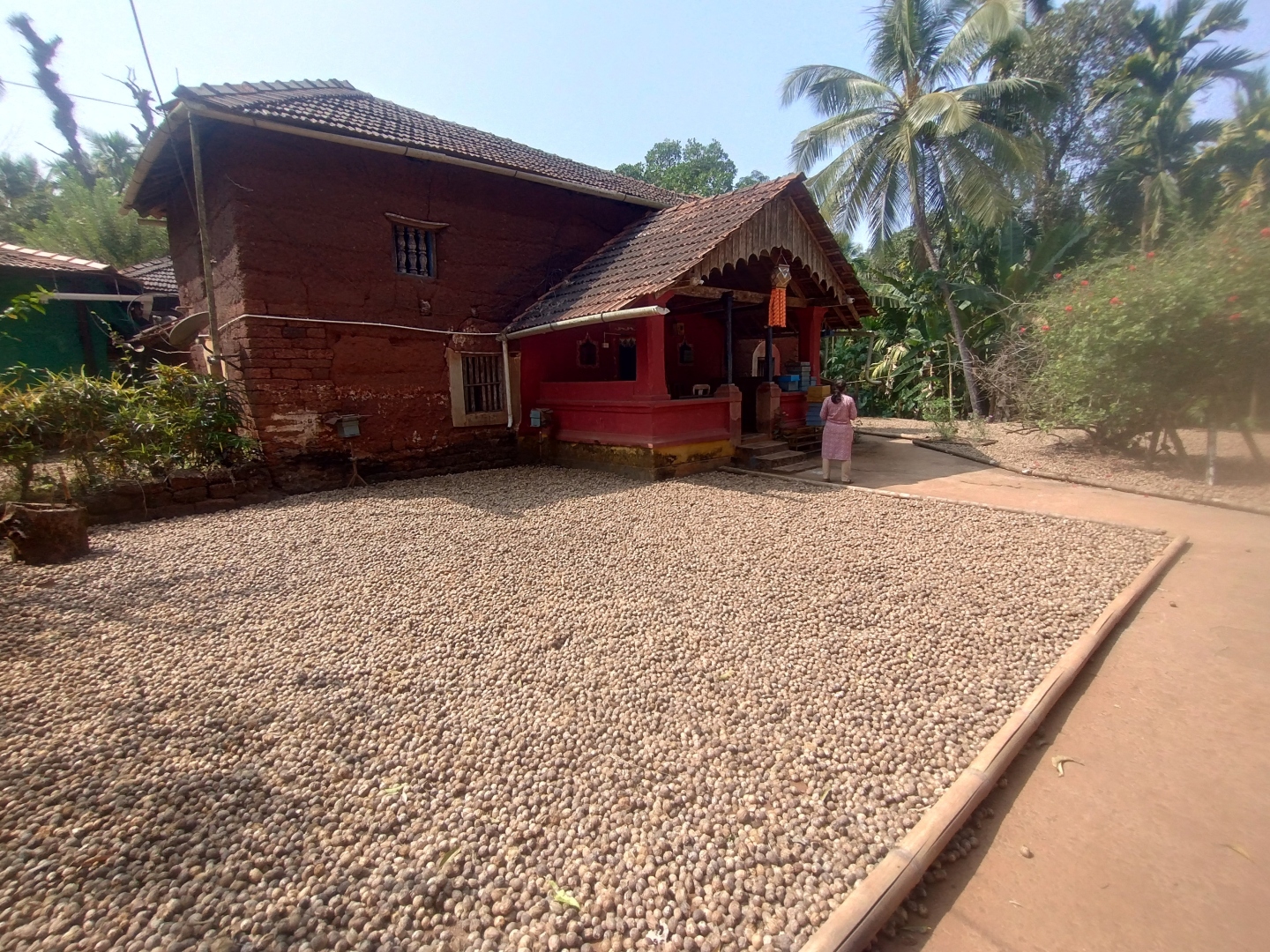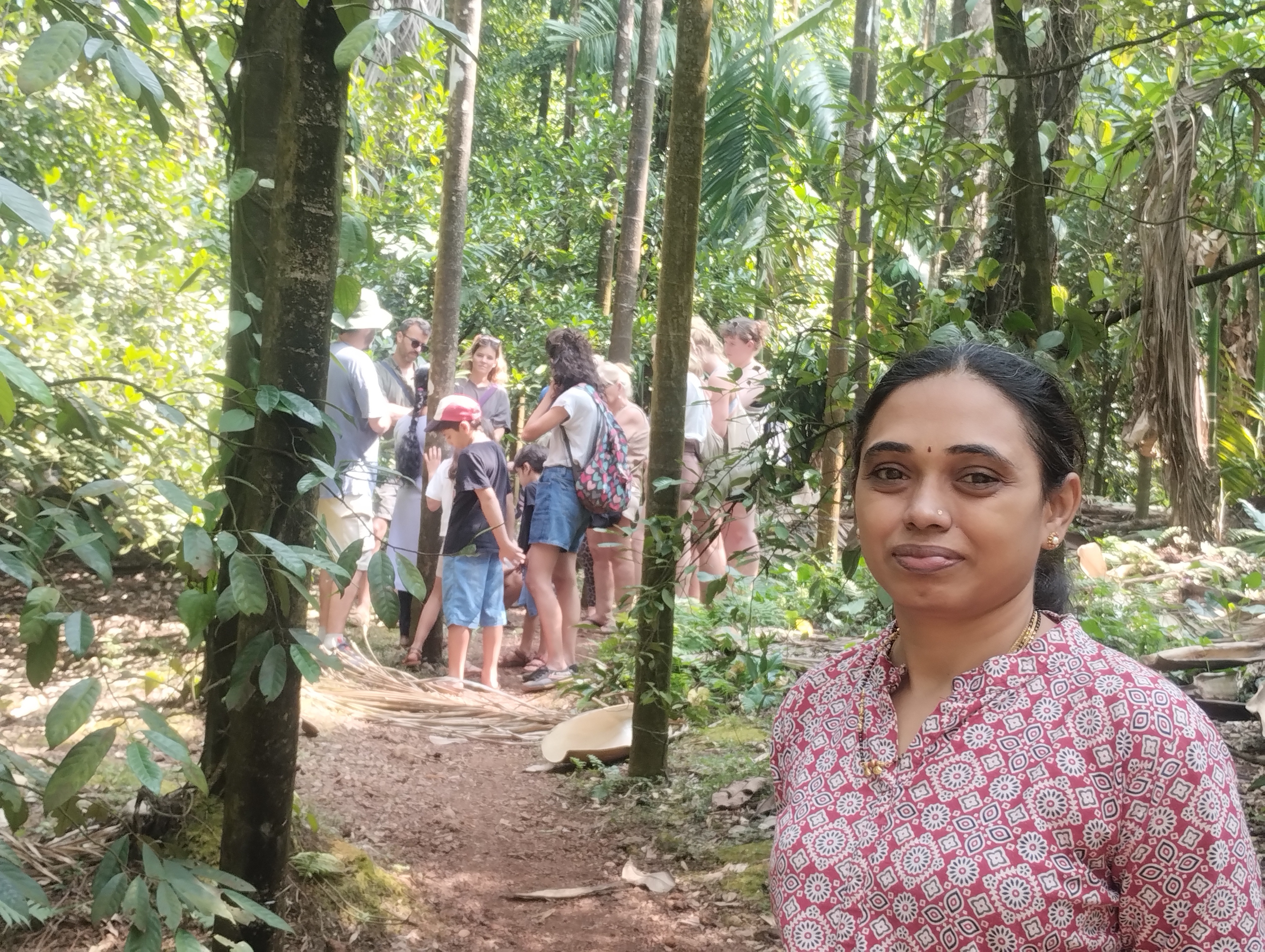Embracing organic farming for the past two decades and taking forward their ancestral agri-business in Netravali, Chinmay and Gauri Tanshikar are the third-generation horticulturists and the recipients of many awards for their innovative ventures

With silence engulfed around, one can listen only to the chirping of birds, with flowing water accompanying wherever the feet takes, is what one finds at the Tanshikar Spice Farm at Netravali village in Sanguem taluka. Spread across 40 acres amidst the rainforests of the Western Ghats, the farm has been witnessing regular footfalls of students, nature lovers and foreigners who wish to venture into experiential tourism. Growing authentic Indian spices and allowing visitors to explore and experience a slice of the Goan culture, food and hospitality amidst thick plantations of coconuts, areca nuts and the aromatic spice trees, the farm has much to offer to the eyes, ears, pallet and feet as one treads in.
Climbing down few steps, one gets a homely feel of a tiny village with several roof-tile structures and a welcome drink. An open bamboo restaurant, reception, villas and tents all constructed with mud walls and floor to add insulation to offer coolness in summer and warmth in winter. Mosquito repellent plants around keep away mosquitoes naturally. This is just a vivid description of what the place looks like. There’s much more to add spice to the tour or the stay. Currently there are 15 cottages for visitors to stay along with a package of spice plantation tour, nature walk, bird watching, and authentic Goan food. Tree house, wooden cottages, pool, meals, jeep safari in wild life sanctuary, trek to waterfall, night trail, adventure activities like wall climbing, balancing bridges, zip line, visit to rock carving, bubble lake and temples are on the platter too.
A counter selling farm fresh products at the front desk greets with aromatic fragrances - Vanilla, cinnamon, clove, nutmeg with/without shell, mace, chilli, green/black cardamom, black/white/green pepper, unprocessed turmeric, coffee (green/roasted beans), raw cocoa powder, various types of pounded powders, jackfruit/mango/jamun/banana papads, nutmeg shell pickle, candy, raw honey, honey bee pollen, lemon grass, pineapple jam, cashew nuts, kokum essence, coconut jaggery, coconut oil, incense sticks etc.
Here’s where the Tanshikar couple greets you – Chinmay and Gauri who are running the entire eco-venture for the past two decades. For the Tanshikars, it was the continuation of their ancestral farming and taking it to the next level by innovative value additions. Chinmay decided to continue their ancestral farming at 20. Wishing to stay close to nature he still finds the decision taken way back in 2005, apt and relevant in 2025. The Tanshikars have been in the forefront to propagate nature tourism apart from being one of the largest producers of nutmeg in Goa. Taking pride in the spicy journey Chinmay quips, “We produce more than 1200 kg nutmeg in a year and 40 to 50% of it is sold across the counter, rest given to shops and factories. We also grow vanilla, cinnamon, black pepper, cardamom, areca nut, cacao, coffee, coconuts, pineapples, cashews and bananas.”
The sustainable agro eco tourism venture began in 2010. The spice plantation tours are being conducted for the past 10 years. “The main motive was to develop our farm, stay in our village and be with the locals. Generating income for the villagers, we employed 28 of them, and thus succeed in controlling their migration from rural to urban areas. They would have long left the village in search of jobs to cities, but the farm has made them retain their lifestyle with ease and earn a decent income. It’s giving back to the nature and to the society – 40 % of our revenue goes back into my village,” reveals Chinmay.
“It was a humble beginning, started with a nondescript roadside sign board leading to our farm,” recalls Chinmay. There was a gradual growth in the popularity of the farm. Today guests who visit market the place as their visits are soulful. For them the visit is satisfying as it takes them closer to nature, away from the hectic hustle bustle of the city, and its chaos. “The cool breeze diminishes the need for fans, coolers or air conditioners. The pleasant climate is more than enough to enjoy a good night’s sleep,” says this commerce graduate who is about to be 50.
“I embraced farming at 20 and my mother Vrushali Tanshikar and wife Gauri sacrificed their own dreams to support me whole heartedly, making my dreams their own. I didn't have any official education in farming but learnt a lot from my father and my own experience. I decided to zero in on agro eco tourism finding it as the best option. Madhav Sahakari of Sahakari Spice Farm willingly shared tips. It’s an organic growth without having to leave your village, property or family,” he asserts.
Awards & rewards
Awards and rewards were a part of his organic journey. Chinmay received the ‘Best Farmer’ award at the hands of Chief Minister late Manohar Parrikar in 2006. He got the Best Horticulturist award ‘Krishi Bhushan’ for organic farming in 2012. In 2016 he received PM Krishi Ratna award at the hands of Prime Minister Narendra Modi in New Delhi for best organic and natural farming. He got Innovative Farming award from Agricultural Minister of India Parshottam Rupala in 2018. ICAR-CCRI Ela Old Goa director Praveen Kumar also nominated him for Padma Shri for sustainable and natural farming in 2022. Chinmay is known for innovative farming because of his value additions to various agri products like nutmeg shell in candy, making papad, figs and flour from banana.
Rest house, eco-friendly cottages
The cottages are build in age old Indian style with open court yard in the middle surrounded by a veranda and rooms at four sides, open to sky bathroom to get a feel of nature, perfect for a group of over a dozen guests, who can stay together like a family. Wooden cottages made from the material of demolished old wooden houses have seasoned wood. We bought the wood from those who wanted to demolish their old wooden houses to have a new bungalow as it is seasoned wood and we did not have to cut down a single new tree to build our wooden cottages that provide open-to-sky-bathrooms and a big veranda. There are new style cottages too, with two floors for families with children. Laundry service, mosquito nets, free Wifi, drinking water, room services and power back up is available along with the open restaurant, made of bamboos and coconut leaves, offering a unique dining experience with freshly cooked food served in mud pots. The aromas in the air are inviting, especially for the foreigners.
Package
Jeep safari in a wild life sanctuary with a local guide with chances of spotting wild animals like black panther, leopard, wild boar, bison, sloth bear, a demonstration of climbing 40 ft straight betel nut (areca nut, supari) tree and how to swing from one tree to another which is the traditional way to harvest the nut. A visit to the nearby ancient ‘bubble lake’, a taste of the jungle honey, and a visit inside the 250-year old house of the Tanshikars where they live along with a visit to a small museum where antique pieces used in the olden days are displayed. Enthusiastic visitors also try their hands at cooking vegetarian dishes using farm fresh spices. There’s buffet meal, and a return gift of aromatic spices to keep the memories afresh even after the visit ends. An internationally certified yoga teacher is also available for those who wish to spend more time learning and improving wellbeing, enjoying organic meals, tuning in to the bioryhtyms of the jungle, sharing a conscious and sustainable ecosystem.
It’s a blessing to sit in the lap of nature: Gauri Tanshikar
Blessed to be sitting in the lap of the nature, Gauri Tanshikar recollects her entry in the farm. “I invested my life in farming activities since my marriage 20 years ago. Beginning soon after my marriage to Chinmay, we both decided to take intercrops, in between the already existing coconut and areca nut trees. As these trees are tall, vegetables cannot be grown below them, as they need sun. So spices and fruit bearing trees was the option, and we chose that. We dedicated our time and energy in growing them. Today we are reaping the fruits,” she agrees.
The couple guides the visitors personally and takes them around the spice plantation, explaining about the spices. A lot of foreigners take keen interest in learning about Indian spices. Gauri vouches that the farm is totally organic. “No chemical/artificial fertiliser is used in the farm. Farm waste of leaves, barks is kept for mulching and used as manure for the trees. The kitchen waste is collected in a pit and compost is produced. Nothing goes to waste. To protect the vanilla crop from bacteria, we depend on a type of ant which eats that bacteria and pesticides are never used. We prefer natural remedies. Natural honey is produced as a bi-product as honey bees help in increasing agriculture production by 100 to 150% due to cross pollination.”
“The farm is blessed with natural water supply throughout the year. The water flows from the nearby bubble lake (popular as Budbudyachi Tali) in the form of a rivulet through our farm, and as the lake has live streams underneath that keep adding water continuously, we are never short of water,” boasts Gauri.
The farm has a natural swimming pool where no chlorine is added for filtration. “There is spring water at just three metre depth so we decided to make a pool. When the water in the pool fills up to the brim it starts overflowing in our well and is used for plantation using sprinklers. Currently, a new swimming pool is being constructed adjacent to the natural one. This will have chlorinated water, as some guests prefer that,” concludes Gauri.